17中国历史故事(二)-中考英语时文阅读练习(含答案解析)
文档属性
| 名称 | 17中国历史故事(二)-中考英语时文阅读练习(含答案解析) | 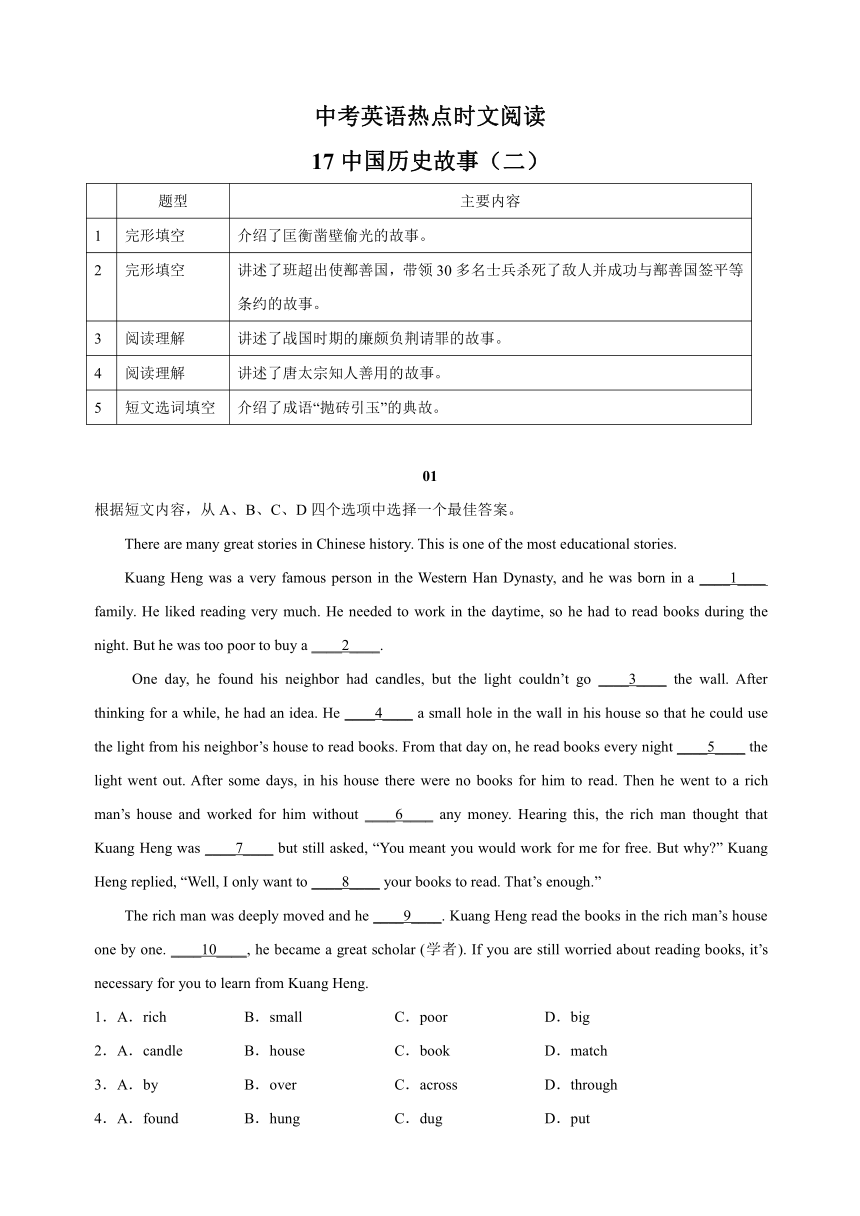 | |
| 格式 | doc | ||
| 文件大小 | 195.0KB | ||
| 资源类型 | 教案 | ||
| 版本资源 | 牛津译林版 | ||
| 科目 | 英语 | ||
| 更新时间 | 2024-03-04 12:40:41 | ||
图片预览

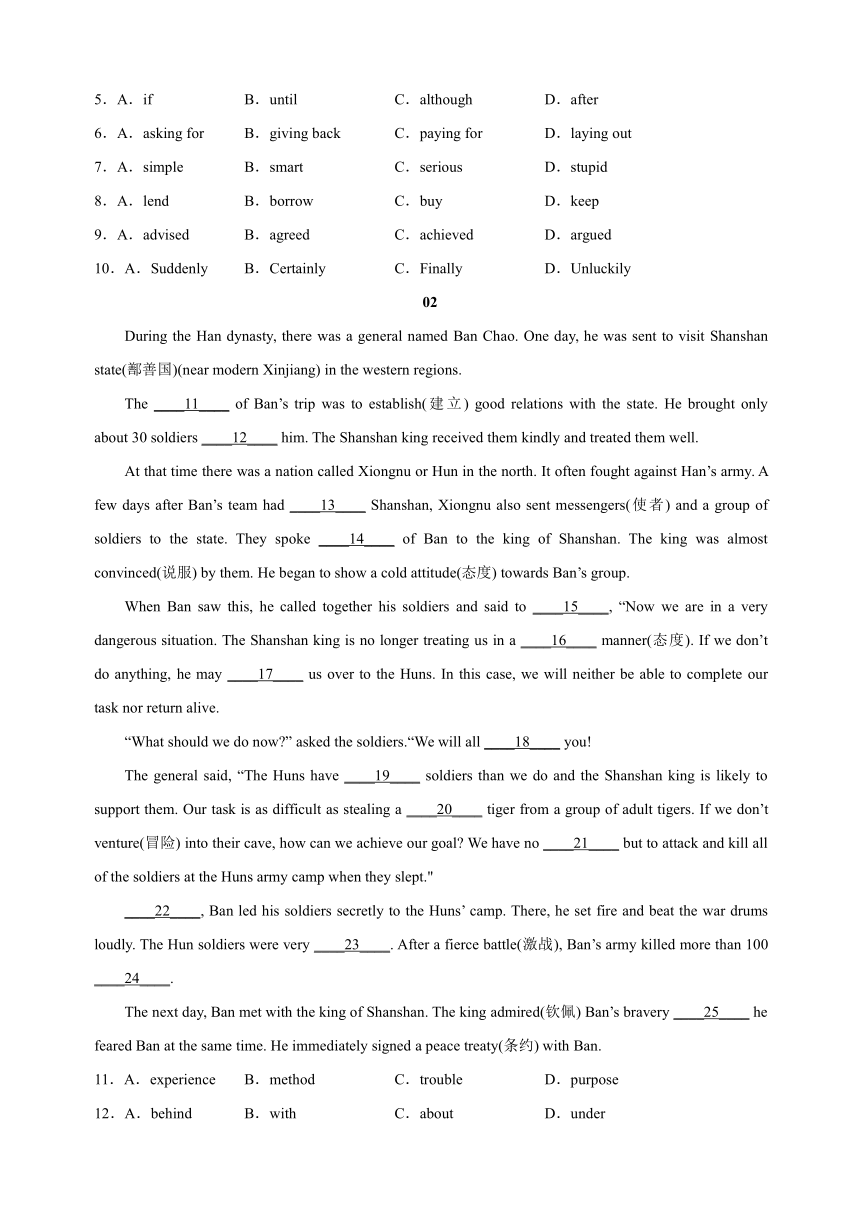
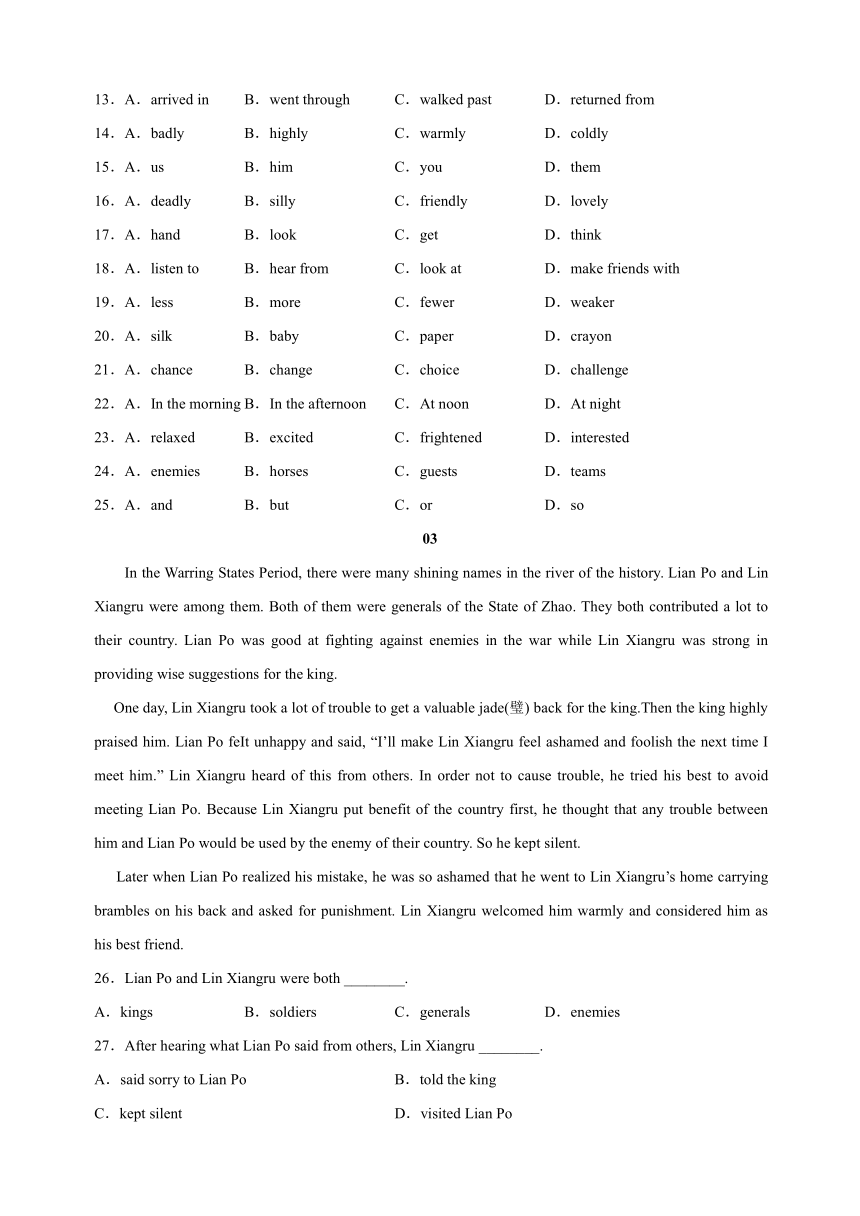
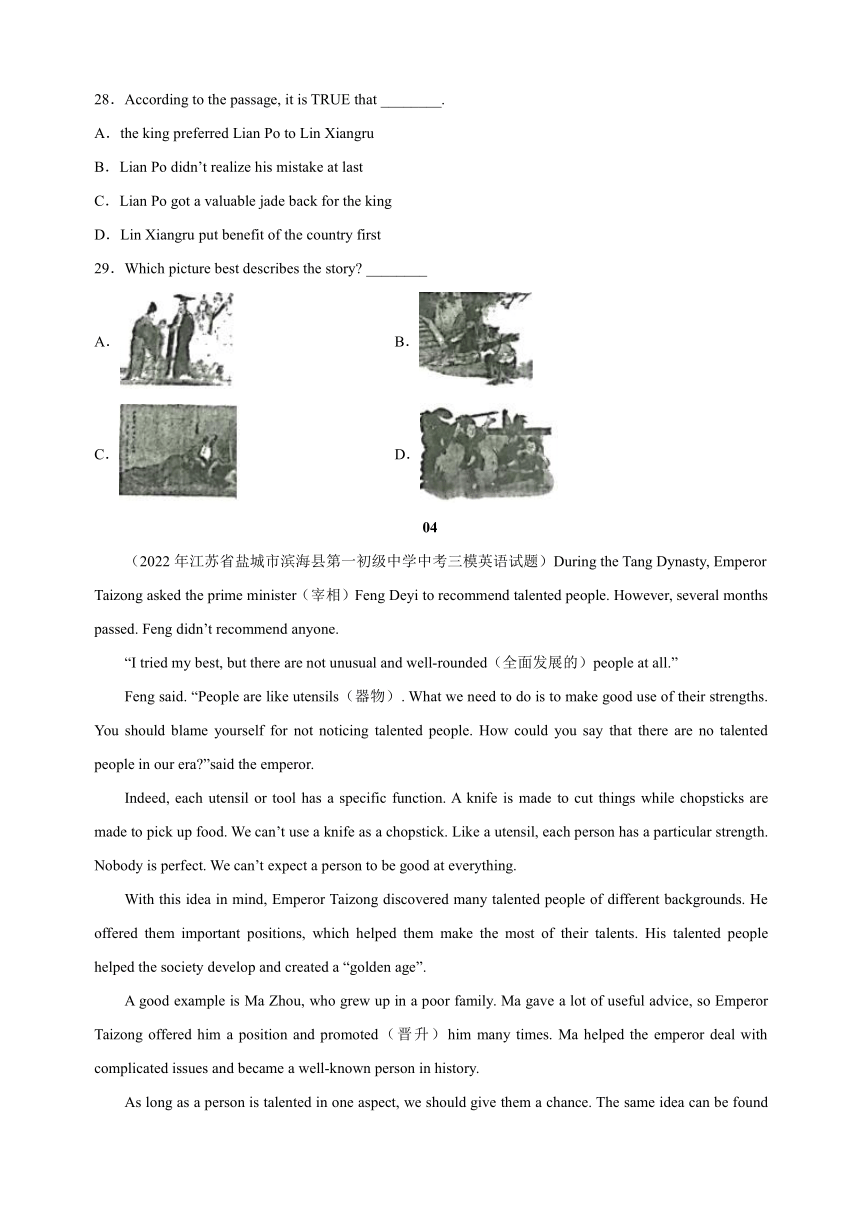
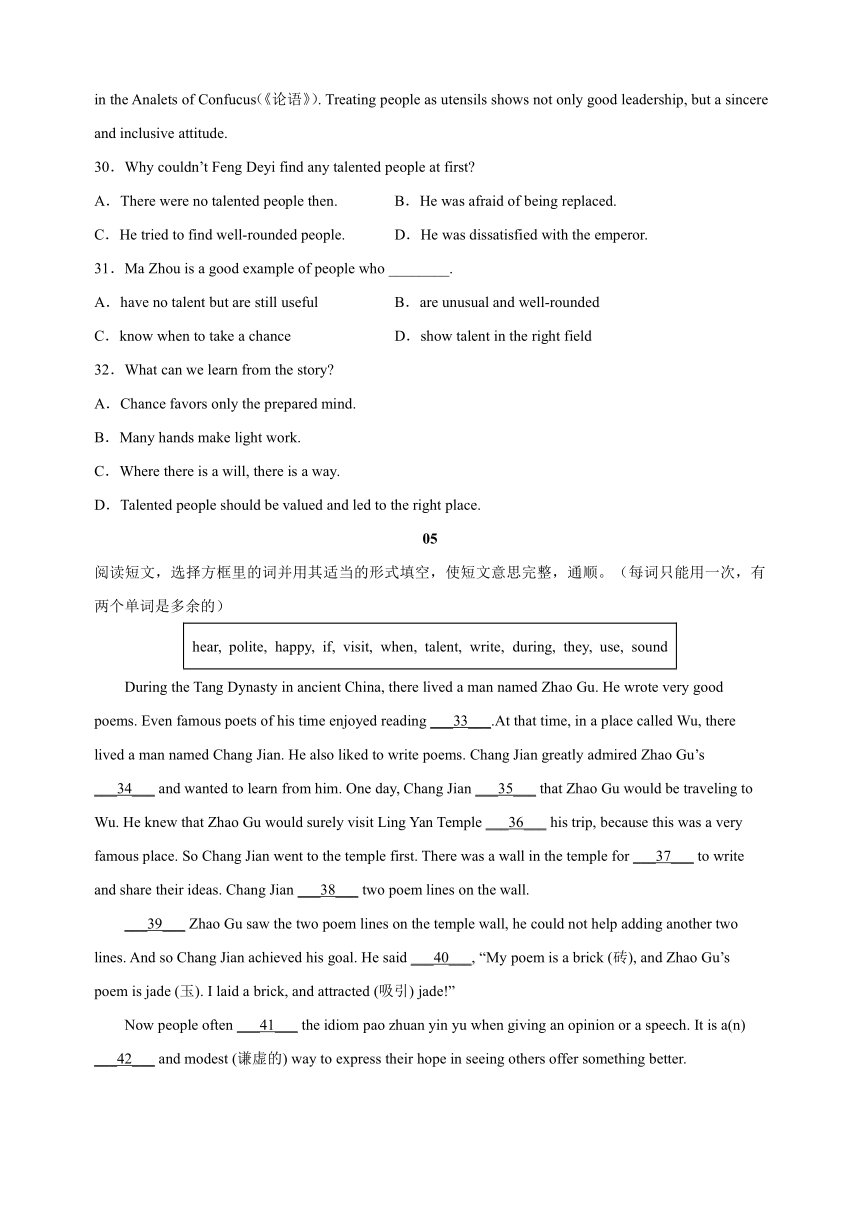
文档简介
中考英语热点时文阅读
17中国历史故事(二)
题型 主要内容
1 完形填空 介绍了匡衡凿壁偷光的故事。
2 完形填空 讲述了班超出使鄯善国,带领30多名士兵杀死了敌人并成功与鄯善国签平等条约的故事。
3 阅读理解 讲述了战国时期的廉颇负荆请罪的故事。
4 阅读理解 讲述了唐太宗知人善用的故事。
5 短文选词填空 介绍了成语“抛砖引玉”的典故。
01
根据短文内容,从A、B、C、D四个选项中选择一个最佳答案。
There are many great stories in Chinese history. This is one of the most educational stories.
Kuang Heng was a very famous person in the Western Han Dynasty, and he was born in a ____1____ family. He liked reading very much. He needed to work in the daytime, so he had to read books during the night. But he was too poor to buy a ____2____.
One day, he found his neighbor had candles, but the light couldn’t go ____3____ the wall. After thinking for a while, he had an idea. He ____4____ a small hole in the wall in his house so that he could use the light from his neighbor’s house to read books. From that day on, he read books every night ____5____ the light went out. After some days, in his house there were no books for him to read. Then he went to a rich man’s house and worked for him without ____6____ any money. Hearing this, the rich man thought that Kuang Heng was ____7____ but still asked, “You meant you would work for me for free. But why ” Kuang Heng replied, “Well, I only want to ____8____ your books to read. That’s enough.”
The rich man was deeply moved and he ____9____. Kuang Heng read the books in the rich man’s house one by one. ____10____, he became a great scholar (学者). If you are still worried about reading books, it’s necessary for you to learn from Kuang Heng.
1.A.rich B.small C.poor D.big
2.A.candle B.house C.book D.match
3.A.by B.over C.across D.through
4.A.found B.hung C.dug D.put
5.A.if B.until C.although D.after
6.A.asking for B.giving back C.paying for D.laying out
7.A.simple B.smart C.serious D.stupid
8.A.lend B.borrow C.buy D.keep
9.A.advised B.agreed C.achieved D.argued
10.A.Suddenly B.Certainly C.Finally D.Unluckily
02
During the Han dynasty, there was a general named Ban Chao. One day, he was sent to visit Shanshan state(鄯善国)(near modern Xinjiang) in the western regions.
The ____11____ of Ban’s trip was to establish(建立) good relations with the state. He brought only about 30 soldiers ____12____ him. The Shanshan king received them kindly and treated them well.
At that time there was a nation called Xiongnu or Hun in the north. It often fought against Han’s army. A few days after Ban’s team had ____13____ Shanshan, Xiongnu also sent messengers(使者) and a group of soldiers to the state. They spoke ____14____ of Ban to the king of Shanshan. The king was almost convinced(说服) by them. He began to show a cold attitude(态度) towards Ban’s group.
When Ban saw this, he called together his soldiers and said to ____15____, “Now we are in a very dangerous situation. The Shanshan king is no longer treating us in a ____16____ manner(态度). If we don’t do anything, he may ____17____ us over to the Huns. In this case, we will neither be able to complete our task nor return alive.
“What should we do now ” asked the soldiers.“We will all ____18____ you!
The general said, “The Huns have ____19____ soldiers than we do and the Shanshan king is likely to support them. Our task is as difficult as stealing a ____20____ tiger from a group of adult tigers. If we don’t venture(冒险) into their cave, how can we achieve our goal We have no ____21____ but to attack and kill all of the soldiers at the Huns army camp when they slept."
____22____, Ban led his soldiers secretly to the Huns’ camp. There, he set fire and beat the war drums loudly. The Hun soldiers were very ____23____. After a fierce battle(激战), Ban’s army killed more than 100 ____24____.
The next day, Ban met with the king of Shanshan. The king admired(钦佩) Ban’s bravery ____25____ he feared Ban at the same time. He immediately signed a peace treaty(条约) with Ban.
11.A.experience B.method C.trouble D.purpose
12.A.behind B.with C.about D.under
13.A.arrived in B.went through C.walked past D.returned from
14.A.badly B.highly C.warmly D.coldly
15.A.us B.him C.you D.them
16.A.deadly B.silly C.friendly D.lovely
17.A.hand B.look C.get D.think
18.A.listen to B.hear from C.look at D.make friends with
19.A.less B.more C.fewer D.weaker
20.A.silk B.baby C.paper D.crayon
21.A.chance B.change C.choice D.challenge
22.A.In the morning B.In the afternoon C.At noon D.At night
23.A.relaxed B.excited C.frightened D.interested
24.A.enemies B.horses C.guests D.teams
25.A.and B.but C.or D.so
03
In the Warring States Period, there were many shining names in the river of the history. Lian Po and Lin Xiangru were among them. Both of them were generals of the State of Zhao. They both contributed a lot to their country. Lian Po was good at fighting against enemies in the war while Lin Xiangru was strong in providing wise suggestions for the king.
One day, Lin Xiangru took a lot of trouble to get a valuable jade(璧) back for the king.Then the king highly praised him. Lian Po feIt unhappy and said, “I’ll make Lin Xiangru feel ashamed and foolish the next time I meet him.” Lin Xiangru heard of this from others. In order not to cause trouble, he tried his best to avoid meeting Lian Po. Because Lin Xiangru put benefit of the country first, he thought that any trouble between him and Lian Po would be used by the enemy of their country. So he kept silent.
Later when Lian Po realized his mistake, he was so ashamed that he went to Lin Xiangru’s home carrying brambles on his back and asked for punishment. Lin Xiangru welcomed him warmly and considered him as his best friend.
26.Lian Po and Lin Xiangru were both ________.
A.kings B.soldiers C.generals D.enemies
27.After hearing what Lian Po said from others, Lin Xiangru ________.
A.said sorry to Lian Po B.told the king
C.kept silent D.visited Lian Po
28.According to the passage, it is TRUE that ________.
A.the king preferred Lian Po to Lin Xiangru
B.Lian Po didn’t realize his mistake at last
C.Lian Po got a valuable jade back for the king
D.Lin Xiangru put benefit of the country first
29.Which picture best describes the story ________
A. B.
C. D.
04
(2022年江苏省盐城市滨海县第一初级中学中考三模英语试题)During the Tang Dynasty, Emperor Taizong asked the prime minister(宰相)Feng Deyi to recommend talented people. However, several months passed. Feng didn’t recommend anyone.
“I tried my best, but there are not unusual and well-rounded(全面发展的)people at all.”
Feng said. “People are like utensils(器物). What we need to do is to make good use of their strengths. You should blame yourself for not noticing talented people. How could you say that there are no talented people in our era ”said the emperor.
Indeed, each utensil or tool has a specific function. A knife is made to cut things while chopsticks are made to pick up food. We can’t use a knife as a chopstick. Like a utensil, each person has a particular strength. Nobody is perfect. We can’t expect a person to be good at everything.
With this idea in mind, Emperor Taizong discovered many talented people of different backgrounds. He offered them important positions, which helped them make the most of their talents. His talented people helped the society develop and created a “golden age”.
A good example is Ma Zhou, who grew up in a poor family. Ma gave a lot of useful advice, so Emperor Taizong offered him a position and promoted(晋升)him many times. Ma helped the emperor deal with complicated issues and became a well-known person in history.
As long as a person is talented in one aspect, we should give them a chance. The same idea can be found in the Analets of Confucus(《论语》). Treating people as utensils shows not only good leadership, but a sincere and inclusive attitude.
30.Why couldn’t Feng Deyi find any talented people at first
A.There were no talented people then. B.He was afraid of being replaced.
C.He tried to find well-rounded people. D.He was dissatisfied with the emperor.
31.Ma Zhou is a good example of people who ________.
A.have no talent but are still useful B.are unusual and well-rounded
C.know when to take a chance D.show talent in the right field
32.What can we learn from the story
A.Chance favors only the prepared mind.
B.Many hands make light work.
C.Where there is a will, there is a way.
D.Talented people should be valued and led to the right place.
05
阅读短文,选择方框里的词并用其适当的形式填空,使短文意思完整,通顺。(每词只能用一次,有两个单词是多余的)
hear, polite, happy, if, visit, when, talent, write, during, they, use, sound
During the Tang Dynasty in ancient China, there lived a man named Zhao Gu. He wrote very good poems. Even famous poets of his time enjoyed reading ___33___.At that time, in a place called Wu, there lived a man named Chang Jian. He also liked to write poems. Chang Jian greatly admired Zhao Gu’s ___34___ and wanted to learn from him. One day, Chang Jian ___35___ that Zhao Gu would be traveling to Wu. He knew that Zhao Gu would surely visit Ling Yan Temple ___36___ his trip, because this was a very famous place. So Chang Jian went to the temple first. There was a wall in the temple for ___37___ to write and share their ideas. Chang Jian ___38___ two poem lines on the wall.
___39___ Zhao Gu saw the two poem lines on the temple wall, he could not help adding another two lines. And so Chang Jian achieved his goal. He said ___40___, “My poem is a brick (砖), and Zhao Gu’s poem is jade (玉). I laid a brick, and attracted (吸引) jade!”
Now people often ___41___ the idiom pao zhuan yin yu when giving an opinion or a speech. It is a(n) ___42___ and modest (谦虚的) way to express their hope in seeing others offer something better.
参考答案
1.C 2.A 3.D 4.C 5.B 6.C 7.D 8.B 9.B 10.C
【导语】本文主要介绍了匡衡凿壁偷光的故事。
1.句意:匡衡是西汉一个很有名的人,他出生在一个贫穷的家庭。
rich富有的;small小的;poor穷的;big大的。根据“But he was too poor”可知是贫穷的家庭,故选C。
2.句意:但是他太穷了,买不起蜡烛。
candle蜡烛;house房子;book书;match比赛。根据下文“One day, he found his neighbor had candles, ”可知是指蜡烛,故选A。
3.句意:有一天,他发现邻居有蜡烛,但光穿不过墙。
by通过;over在上面;across穿过;through通过。根据“but the light couldn’t go...the wall.”可知是指光穿过墙,是从内部穿过,应用through,故选D。
4.句意:他在自己房子的墙上挖了一个小洞,这样他就可以利用邻居家的灯光看书了。
found找到;hung悬挂;dug挖;put放置。根据“a small hole in the wall”可知是挖一个洞,故选C。
5.句意:从那天起,他每天晚上都读书,直到熄灯。
if如果;until直到;although尽管;after以后。根据“he read books every night...the light went out.”可知是指匡衡看书直到邻居的灯熄灭,故选B。
6.句意:然后,他去了一个富人的房子,为他工作,不需要给自己钱。
asking for要求;giving back归还;paying for支付;laying out布置。根据“You meant you would work for me for free”可知匡衡为富人工作,不需要薪水,故选C。
7.句意:富人听了,觉得匡衡太傻了。
simple简单的;smart聪明的;serious严肃的;stupid愚蠢的。结合生活实际可知,一个人工作却不要任何报酬,别人会觉得对方很傻,故选D。
8.句意:我只是想借你的书来看。
lend借出;borrow借入;buy买;keep保持。根据“Well, I only want to...your books to read”可知是指匡衡要借书看,此处是指借入书,应用borrow,故选B。
9.句意:富人被深深打动了,他同意了。
advised建议;agreed同意;achieved实现;argued争吵。根据“deeply moved ”可知富人被匡衡的话感动了,于是同意了匡衡的要求,故选B。
10.句意:最后,他成了一名伟大的学者。
Suddenly突然;Certainly当然;Finally最终;Unluckily不幸地。根据“he became a great scholar (学者).”可知是指最终匡衡成为了一名伟大的学者,故选C。
11.D 12.B 13.A 14.A 15.D 16.C 17.A 18.A 19.B 20.B 21.C 22.D 23.C 24.A 25.A
【导语】本文主要讲述了班超出使鄯善国,带领30多名士兵杀死了敌人并成功与鄯善国签平等条约的故事。
11.句意:班超此行的目的是与鄯善国建立良好关系。
experience经历;method方法;trouble困扰;purpose目的。根据“The …of Ban’s trip was to establish(建立) good relations with the state.”可知,介绍他此行的目的是与鄯善国建立良好关系,故选D。
12.句意:他只带了大约30名士兵。
behind在……后面;with带有;about关于;under在……下面。根据“He brought only about 30 soldiers … him”可知,随身携带了约30名士兵,故选B。
13.句意:班超的队伍到达鄯善国几天后,匈奴也派使者和一队士兵到鄯善国。
arrived in到达;went through经历;walked past路过;returned from从……回来。根据“A few days after Ban’s team had … Shanshan”可知,此处指到达鄯善国,故选A。
14.句意:他们对鄯善国王说班超的坏话。
badly糟糕地;highly高地;warmly暖和地;coldly寒冷地。根据“He began to show a cold attitude(态度) towards Ban’s group”可知,对国王说班超的坏话,最后国王对班超的队伍表现出冷淡的态度,故选A。
15.句意:班超看到后,召集士兵对他们说。
us我们;him他;you你;them他们。根据“he called together his soldiers”可知,此处是指对这些士兵说,应填them,故选D。
16.句意:鄯善国王对我们不再友好了。
deadly夺命;silly愚蠢的;friendly友好的;lovely可爱的。根据“He began to show a cold attitude(态度) towards Ban’s group”可知,班超根据国王对他们的态度判断,不会再对他们友好了,故选C。
17.句意:如果我们什么都不做,他可能会把我们交给匈奴人。
hand交给;look看;get得到;think认为。根据“us over to the Huns”可知,把我们交给匈奴,故选A。
18.句意:我们都听你的。
listen to听;hear from听说;look at看;make friends with与……交朋友。根据“What should we do now”可知,士兵询问班超的意见,都会听从他的安排,故选A。
19.句意:匈奴的士兵比我们多,鄯善国王很可能会支持他们。
less较少的;more较多的;fewer较少的;weaker更虚弱的。根据“The Huns have…soldiers than we do and the Shanshan king is likely to support them”可知,匈奴的士兵更多,所以鄯善国王才会支持他们,故选B。
20.句意:我们的任务就像从一群成年老虎那里偷一只小老虎一样困难。
silk丝绸;baby婴儿;paper纸;crayon蜡笔。根据“If we don’t venture(冒险) into their cave, how can we achieve our goal”可知,此处借用于“不入虎穴焉得虎子”这个道理来告诉士兵接下来的冒险,故选B。
21.句意:我们别无选择,只能趁匈奴人熟睡的时候,攻击并杀死他们。
chance机会;change改变;choice选择;challenge挑战。have no choice but to do sth“除了做某事,别无选择”,故选C。
22.句意:晚上,班超带着他的士兵秘密来到匈奴的营地。
In the morning在早上;In the afternoon在下午;At noon在中午;At night在晚上。根据“attack and kill all of the soldiers at the Huns army camp when they slept”可知,在晚上入睡的时候偷袭他们,故选D。
23.句意:匈奴兵非常害怕。
relaxed放松的;excited兴奋的;frightened害怕的;interested感兴趣的。根据“There, he set fire and beat the war drums loudly”可知,匈奴兵在晚上熟睡的时候听到这些声音感到很害怕,故选C。
24.句意:经过激烈的战斗,班超的军队杀死了100多名敌人。
enemies敌人;horses马;guests客人;teams团队。根据“After a fierce battle(激战), Ban’s army killed more than 100 ”可知,杀死了100多名敌人,故选A。
25.句意:国王既钦佩班超的勇敢,又害怕他。
and和;but但是;or或者;so因此。“admired(钦佩) Ban’s bravery”与“he feared Ban at the same time”是并列关系,故选A。
26.C 27.C 28.D 29.B
【导语】本文主要讲述了战国时期的廉颇负荆请罪的故事。
26.细节理解题。根据“Both of them were generals of the State of Zhao.“可知,他们都是赵国的将军。故选C。
27.细节理解题。根据“So he kept silent.”可知,听了别人的话,蔺相如保持沉默。故选C。
28.推理判断题。根据“Because Lin Xiangru put benefit of the country first, he thought that any trouble between him and Lian Po would be used by the enemy of their country.”可知,因为蔺相如把国家利益放在第一位,所以他认为自己和廉颇之间的任何麻烦都会被国家的敌人所利用。由此可知,藺相如把国家利益放在第一位。故选D。
29.推理判断题。本文主要讲述了战国时期的廉颇负荆请罪的故事,结合图画内容可知,B图最能描述这个故事。故选B。
30.C 31.D 32.D
【导语】本文主要讲述了唐太宗知人善用的故事。
30.推理判断题。根据“I tried my best, but there are not unusual and well-rounded(全面发展的)people at all”可知,他试图找一些全面发展的人,故选C。
31.推理判断题。根据“Ma gave a lot of useful advice, so Emperor Taizong offered him a position and promoted(晋升)him many times”可知,Ma Zhou在正确的地方发挥了才能,所以才能给太宗皇帝提出好建议,故选D。
32.推理判断题。根据全文内容可知,每个人的才能都不同,我们要善于发现每个人的优势,并好好利用起来,故选D。
33.them 34.talent 35.heard 36.during 37.visitors 38.wrote 39.When 40.happily
41.use 42.polite
【导语】本文主要介绍了成语“抛砖引玉”的典故。
33.句意:即使是他那个时代的著名诗人也喜欢阅读它们。根据“He wrote very good poems.”可知,人们爱读他的诗歌,空处用they的宾格them指代“poems”。故填them。
34.句意:常建非常钦佩赵嘏的才华,想向他学习。根据“…wanted to learn from him.”可知,他欣赏赵嘏的才华,talent“才华”符合语境。故填talent。
35.句意:有一天,常建听说赵嘏要去吴。根据“…that Zhao Gu would be traveling to Wu.”可知,空处缺谓语,时态是一般过去时,后接宾语从句,常建听说了这件事,hear“听说”符合语境,过去式是heard。故填heard。
36.句意:知道赵嘏在旅行期间一定会参观灵岩寺,因为这是一个非常有名的地方。根据“…his trip”可知,此处作状语,表示“在旅行期间”,用during。故填during。
37.句意:寺庙里有一面墙,供游客书写和分享他们的想法。根据“…to write and share their ideas.”可知,游客们在墙上写字,visit“参观”需变为名词复数visitors“游客”。故填visitors。
38.句意:常建在墙上写了两行诗。根据“…two poem lines on the wall.”可知,他写了两行诗,时态是一般过去时,用write的过去式wrote。故填wrote。
39.句意:赵嘏看到庙墙上的两行诗,不禁又添了两行。空处应填一状语从句引导词,表示“当赵嘏看到这两行诗”,用when引导从句。故填When。
40.句意:他高兴地说:“我的诗是砖,赵固的诗是玉。我铺了一块砖,吸引了玉!”根据“And so Chang Jian achieved his goal.”可知,他实现了目标很开心,空处用副词修饰动词“said”,happily“开心地”符合语境。故填happily。
41.句意:现在人们在发表意见或演讲时经常使用成语“抛砖引玉”。空处缺谓语,时态为一般现在时,表示使用这个成语,use“使用”,主语“people”是复数。故填use。
42.句意:这是一种礼貌和谦虚的方式,表达他们希望看到别人提供更好的东西。根据常识和“modest”可知,“抛砖引玉”是一种礼貌、谦虚的说法,polite“礼貌的”,作表语。故填polite。
17中国历史故事(二)
题型 主要内容
1 完形填空 介绍了匡衡凿壁偷光的故事。
2 完形填空 讲述了班超出使鄯善国,带领30多名士兵杀死了敌人并成功与鄯善国签平等条约的故事。
3 阅读理解 讲述了战国时期的廉颇负荆请罪的故事。
4 阅读理解 讲述了唐太宗知人善用的故事。
5 短文选词填空 介绍了成语“抛砖引玉”的典故。
01
根据短文内容,从A、B、C、D四个选项中选择一个最佳答案。
There are many great stories in Chinese history. This is one of the most educational stories.
Kuang Heng was a very famous person in the Western Han Dynasty, and he was born in a ____1____ family. He liked reading very much. He needed to work in the daytime, so he had to read books during the night. But he was too poor to buy a ____2____.
One day, he found his neighbor had candles, but the light couldn’t go ____3____ the wall. After thinking for a while, he had an idea. He ____4____ a small hole in the wall in his house so that he could use the light from his neighbor’s house to read books. From that day on, he read books every night ____5____ the light went out. After some days, in his house there were no books for him to read. Then he went to a rich man’s house and worked for him without ____6____ any money. Hearing this, the rich man thought that Kuang Heng was ____7____ but still asked, “You meant you would work for me for free. But why ” Kuang Heng replied, “Well, I only want to ____8____ your books to read. That’s enough.”
The rich man was deeply moved and he ____9____. Kuang Heng read the books in the rich man’s house one by one. ____10____, he became a great scholar (学者). If you are still worried about reading books, it’s necessary for you to learn from Kuang Heng.
1.A.rich B.small C.poor D.big
2.A.candle B.house C.book D.match
3.A.by B.over C.across D.through
4.A.found B.hung C.dug D.put
5.A.if B.until C.although D.after
6.A.asking for B.giving back C.paying for D.laying out
7.A.simple B.smart C.serious D.stupid
8.A.lend B.borrow C.buy D.keep
9.A.advised B.agreed C.achieved D.argued
10.A.Suddenly B.Certainly C.Finally D.Unluckily
02
During the Han dynasty, there was a general named Ban Chao. One day, he was sent to visit Shanshan state(鄯善国)(near modern Xinjiang) in the western regions.
The ____11____ of Ban’s trip was to establish(建立) good relations with the state. He brought only about 30 soldiers ____12____ him. The Shanshan king received them kindly and treated them well.
At that time there was a nation called Xiongnu or Hun in the north. It often fought against Han’s army. A few days after Ban’s team had ____13____ Shanshan, Xiongnu also sent messengers(使者) and a group of soldiers to the state. They spoke ____14____ of Ban to the king of Shanshan. The king was almost convinced(说服) by them. He began to show a cold attitude(态度) towards Ban’s group.
When Ban saw this, he called together his soldiers and said to ____15____, “Now we are in a very dangerous situation. The Shanshan king is no longer treating us in a ____16____ manner(态度). If we don’t do anything, he may ____17____ us over to the Huns. In this case, we will neither be able to complete our task nor return alive.
“What should we do now ” asked the soldiers.“We will all ____18____ you!
The general said, “The Huns have ____19____ soldiers than we do and the Shanshan king is likely to support them. Our task is as difficult as stealing a ____20____ tiger from a group of adult tigers. If we don’t venture(冒险) into their cave, how can we achieve our goal We have no ____21____ but to attack and kill all of the soldiers at the Huns army camp when they slept."
____22____, Ban led his soldiers secretly to the Huns’ camp. There, he set fire and beat the war drums loudly. The Hun soldiers were very ____23____. After a fierce battle(激战), Ban’s army killed more than 100 ____24____.
The next day, Ban met with the king of Shanshan. The king admired(钦佩) Ban’s bravery ____25____ he feared Ban at the same time. He immediately signed a peace treaty(条约) with Ban.
11.A.experience B.method C.trouble D.purpose
12.A.behind B.with C.about D.under
13.A.arrived in B.went through C.walked past D.returned from
14.A.badly B.highly C.warmly D.coldly
15.A.us B.him C.you D.them
16.A.deadly B.silly C.friendly D.lovely
17.A.hand B.look C.get D.think
18.A.listen to B.hear from C.look at D.make friends with
19.A.less B.more C.fewer D.weaker
20.A.silk B.baby C.paper D.crayon
21.A.chance B.change C.choice D.challenge
22.A.In the morning B.In the afternoon C.At noon D.At night
23.A.relaxed B.excited C.frightened D.interested
24.A.enemies B.horses C.guests D.teams
25.A.and B.but C.or D.so
03
In the Warring States Period, there were many shining names in the river of the history. Lian Po and Lin Xiangru were among them. Both of them were generals of the State of Zhao. They both contributed a lot to their country. Lian Po was good at fighting against enemies in the war while Lin Xiangru was strong in providing wise suggestions for the king.
One day, Lin Xiangru took a lot of trouble to get a valuable jade(璧) back for the king.Then the king highly praised him. Lian Po feIt unhappy and said, “I’ll make Lin Xiangru feel ashamed and foolish the next time I meet him.” Lin Xiangru heard of this from others. In order not to cause trouble, he tried his best to avoid meeting Lian Po. Because Lin Xiangru put benefit of the country first, he thought that any trouble between him and Lian Po would be used by the enemy of their country. So he kept silent.
Later when Lian Po realized his mistake, he was so ashamed that he went to Lin Xiangru’s home carrying brambles on his back and asked for punishment. Lin Xiangru welcomed him warmly and considered him as his best friend.
26.Lian Po and Lin Xiangru were both ________.
A.kings B.soldiers C.generals D.enemies
27.After hearing what Lian Po said from others, Lin Xiangru ________.
A.said sorry to Lian Po B.told the king
C.kept silent D.visited Lian Po
28.According to the passage, it is TRUE that ________.
A.the king preferred Lian Po to Lin Xiangru
B.Lian Po didn’t realize his mistake at last
C.Lian Po got a valuable jade back for the king
D.Lin Xiangru put benefit of the country first
29.Which picture best describes the story ________
A. B.
C. D.
04
(2022年江苏省盐城市滨海县第一初级中学中考三模英语试题)During the Tang Dynasty, Emperor Taizong asked the prime minister(宰相)Feng Deyi to recommend talented people. However, several months passed. Feng didn’t recommend anyone.
“I tried my best, but there are not unusual and well-rounded(全面发展的)people at all.”
Feng said. “People are like utensils(器物). What we need to do is to make good use of their strengths. You should blame yourself for not noticing talented people. How could you say that there are no talented people in our era ”said the emperor.
Indeed, each utensil or tool has a specific function. A knife is made to cut things while chopsticks are made to pick up food. We can’t use a knife as a chopstick. Like a utensil, each person has a particular strength. Nobody is perfect. We can’t expect a person to be good at everything.
With this idea in mind, Emperor Taizong discovered many talented people of different backgrounds. He offered them important positions, which helped them make the most of their talents. His talented people helped the society develop and created a “golden age”.
A good example is Ma Zhou, who grew up in a poor family. Ma gave a lot of useful advice, so Emperor Taizong offered him a position and promoted(晋升)him many times. Ma helped the emperor deal with complicated issues and became a well-known person in history.
As long as a person is talented in one aspect, we should give them a chance. The same idea can be found in the Analets of Confucus(《论语》). Treating people as utensils shows not only good leadership, but a sincere and inclusive attitude.
30.Why couldn’t Feng Deyi find any talented people at first
A.There were no talented people then. B.He was afraid of being replaced.
C.He tried to find well-rounded people. D.He was dissatisfied with the emperor.
31.Ma Zhou is a good example of people who ________.
A.have no talent but are still useful B.are unusual and well-rounded
C.know when to take a chance D.show talent in the right field
32.What can we learn from the story
A.Chance favors only the prepared mind.
B.Many hands make light work.
C.Where there is a will, there is a way.
D.Talented people should be valued and led to the right place.
05
阅读短文,选择方框里的词并用其适当的形式填空,使短文意思完整,通顺。(每词只能用一次,有两个单词是多余的)
hear, polite, happy, if, visit, when, talent, write, during, they, use, sound
During the Tang Dynasty in ancient China, there lived a man named Zhao Gu. He wrote very good poems. Even famous poets of his time enjoyed reading ___33___.At that time, in a place called Wu, there lived a man named Chang Jian. He also liked to write poems. Chang Jian greatly admired Zhao Gu’s ___34___ and wanted to learn from him. One day, Chang Jian ___35___ that Zhao Gu would be traveling to Wu. He knew that Zhao Gu would surely visit Ling Yan Temple ___36___ his trip, because this was a very famous place. So Chang Jian went to the temple first. There was a wall in the temple for ___37___ to write and share their ideas. Chang Jian ___38___ two poem lines on the wall.
___39___ Zhao Gu saw the two poem lines on the temple wall, he could not help adding another two lines. And so Chang Jian achieved his goal. He said ___40___, “My poem is a brick (砖), and Zhao Gu’s poem is jade (玉). I laid a brick, and attracted (吸引) jade!”
Now people often ___41___ the idiom pao zhuan yin yu when giving an opinion or a speech. It is a(n) ___42___ and modest (谦虚的) way to express their hope in seeing others offer something better.
参考答案
1.C 2.A 3.D 4.C 5.B 6.C 7.D 8.B 9.B 10.C
【导语】本文主要介绍了匡衡凿壁偷光的故事。
1.句意:匡衡是西汉一个很有名的人,他出生在一个贫穷的家庭。
rich富有的;small小的;poor穷的;big大的。根据“But he was too poor”可知是贫穷的家庭,故选C。
2.句意:但是他太穷了,买不起蜡烛。
candle蜡烛;house房子;book书;match比赛。根据下文“One day, he found his neighbor had candles, ”可知是指蜡烛,故选A。
3.句意:有一天,他发现邻居有蜡烛,但光穿不过墙。
by通过;over在上面;across穿过;through通过。根据“but the light couldn’t go...the wall.”可知是指光穿过墙,是从内部穿过,应用through,故选D。
4.句意:他在自己房子的墙上挖了一个小洞,这样他就可以利用邻居家的灯光看书了。
found找到;hung悬挂;dug挖;put放置。根据“a small hole in the wall”可知是挖一个洞,故选C。
5.句意:从那天起,他每天晚上都读书,直到熄灯。
if如果;until直到;although尽管;after以后。根据“he read books every night...the light went out.”可知是指匡衡看书直到邻居的灯熄灭,故选B。
6.句意:然后,他去了一个富人的房子,为他工作,不需要给自己钱。
asking for要求;giving back归还;paying for支付;laying out布置。根据“You meant you would work for me for free”可知匡衡为富人工作,不需要薪水,故选C。
7.句意:富人听了,觉得匡衡太傻了。
simple简单的;smart聪明的;serious严肃的;stupid愚蠢的。结合生活实际可知,一个人工作却不要任何报酬,别人会觉得对方很傻,故选D。
8.句意:我只是想借你的书来看。
lend借出;borrow借入;buy买;keep保持。根据“Well, I only want to...your books to read”可知是指匡衡要借书看,此处是指借入书,应用borrow,故选B。
9.句意:富人被深深打动了,他同意了。
advised建议;agreed同意;achieved实现;argued争吵。根据“deeply moved ”可知富人被匡衡的话感动了,于是同意了匡衡的要求,故选B。
10.句意:最后,他成了一名伟大的学者。
Suddenly突然;Certainly当然;Finally最终;Unluckily不幸地。根据“he became a great scholar (学者).”可知是指最终匡衡成为了一名伟大的学者,故选C。
11.D 12.B 13.A 14.A 15.D 16.C 17.A 18.A 19.B 20.B 21.C 22.D 23.C 24.A 25.A
【导语】本文主要讲述了班超出使鄯善国,带领30多名士兵杀死了敌人并成功与鄯善国签平等条约的故事。
11.句意:班超此行的目的是与鄯善国建立良好关系。
experience经历;method方法;trouble困扰;purpose目的。根据“The …of Ban’s trip was to establish(建立) good relations with the state.”可知,介绍他此行的目的是与鄯善国建立良好关系,故选D。
12.句意:他只带了大约30名士兵。
behind在……后面;with带有;about关于;under在……下面。根据“He brought only about 30 soldiers … him”可知,随身携带了约30名士兵,故选B。
13.句意:班超的队伍到达鄯善国几天后,匈奴也派使者和一队士兵到鄯善国。
arrived in到达;went through经历;walked past路过;returned from从……回来。根据“A few days after Ban’s team had … Shanshan”可知,此处指到达鄯善国,故选A。
14.句意:他们对鄯善国王说班超的坏话。
badly糟糕地;highly高地;warmly暖和地;coldly寒冷地。根据“He began to show a cold attitude(态度) towards Ban’s group”可知,对国王说班超的坏话,最后国王对班超的队伍表现出冷淡的态度,故选A。
15.句意:班超看到后,召集士兵对他们说。
us我们;him他;you你;them他们。根据“he called together his soldiers”可知,此处是指对这些士兵说,应填them,故选D。
16.句意:鄯善国王对我们不再友好了。
deadly夺命;silly愚蠢的;friendly友好的;lovely可爱的。根据“He began to show a cold attitude(态度) towards Ban’s group”可知,班超根据国王对他们的态度判断,不会再对他们友好了,故选C。
17.句意:如果我们什么都不做,他可能会把我们交给匈奴人。
hand交给;look看;get得到;think认为。根据“us over to the Huns”可知,把我们交给匈奴,故选A。
18.句意:我们都听你的。
listen to听;hear from听说;look at看;make friends with与……交朋友。根据“What should we do now”可知,士兵询问班超的意见,都会听从他的安排,故选A。
19.句意:匈奴的士兵比我们多,鄯善国王很可能会支持他们。
less较少的;more较多的;fewer较少的;weaker更虚弱的。根据“The Huns have…soldiers than we do and the Shanshan king is likely to support them”可知,匈奴的士兵更多,所以鄯善国王才会支持他们,故选B。
20.句意:我们的任务就像从一群成年老虎那里偷一只小老虎一样困难。
silk丝绸;baby婴儿;paper纸;crayon蜡笔。根据“If we don’t venture(冒险) into their cave, how can we achieve our goal”可知,此处借用于“不入虎穴焉得虎子”这个道理来告诉士兵接下来的冒险,故选B。
21.句意:我们别无选择,只能趁匈奴人熟睡的时候,攻击并杀死他们。
chance机会;change改变;choice选择;challenge挑战。have no choice but to do sth“除了做某事,别无选择”,故选C。
22.句意:晚上,班超带着他的士兵秘密来到匈奴的营地。
In the morning在早上;In the afternoon在下午;At noon在中午;At night在晚上。根据“attack and kill all of the soldiers at the Huns army camp when they slept”可知,在晚上入睡的时候偷袭他们,故选D。
23.句意:匈奴兵非常害怕。
relaxed放松的;excited兴奋的;frightened害怕的;interested感兴趣的。根据“There, he set fire and beat the war drums loudly”可知,匈奴兵在晚上熟睡的时候听到这些声音感到很害怕,故选C。
24.句意:经过激烈的战斗,班超的军队杀死了100多名敌人。
enemies敌人;horses马;guests客人;teams团队。根据“After a fierce battle(激战), Ban’s army killed more than 100 ”可知,杀死了100多名敌人,故选A。
25.句意:国王既钦佩班超的勇敢,又害怕他。
and和;but但是;or或者;so因此。“admired(钦佩) Ban’s bravery”与“he feared Ban at the same time”是并列关系,故选A。
26.C 27.C 28.D 29.B
【导语】本文主要讲述了战国时期的廉颇负荆请罪的故事。
26.细节理解题。根据“Both of them were generals of the State of Zhao.“可知,他们都是赵国的将军。故选C。
27.细节理解题。根据“So he kept silent.”可知,听了别人的话,蔺相如保持沉默。故选C。
28.推理判断题。根据“Because Lin Xiangru put benefit of the country first, he thought that any trouble between him and Lian Po would be used by the enemy of their country.”可知,因为蔺相如把国家利益放在第一位,所以他认为自己和廉颇之间的任何麻烦都会被国家的敌人所利用。由此可知,藺相如把国家利益放在第一位。故选D。
29.推理判断题。本文主要讲述了战国时期的廉颇负荆请罪的故事,结合图画内容可知,B图最能描述这个故事。故选B。
30.C 31.D 32.D
【导语】本文主要讲述了唐太宗知人善用的故事。
30.推理判断题。根据“I tried my best, but there are not unusual and well-rounded(全面发展的)people at all”可知,他试图找一些全面发展的人,故选C。
31.推理判断题。根据“Ma gave a lot of useful advice, so Emperor Taizong offered him a position and promoted(晋升)him many times”可知,Ma Zhou在正确的地方发挥了才能,所以才能给太宗皇帝提出好建议,故选D。
32.推理判断题。根据全文内容可知,每个人的才能都不同,我们要善于发现每个人的优势,并好好利用起来,故选D。
33.them 34.talent 35.heard 36.during 37.visitors 38.wrote 39.When 40.happily
41.use 42.polite
【导语】本文主要介绍了成语“抛砖引玉”的典故。
33.句意:即使是他那个时代的著名诗人也喜欢阅读它们。根据“He wrote very good poems.”可知,人们爱读他的诗歌,空处用they的宾格them指代“poems”。故填them。
34.句意:常建非常钦佩赵嘏的才华,想向他学习。根据“…wanted to learn from him.”可知,他欣赏赵嘏的才华,talent“才华”符合语境。故填talent。
35.句意:有一天,常建听说赵嘏要去吴。根据“…that Zhao Gu would be traveling to Wu.”可知,空处缺谓语,时态是一般过去时,后接宾语从句,常建听说了这件事,hear“听说”符合语境,过去式是heard。故填heard。
36.句意:知道赵嘏在旅行期间一定会参观灵岩寺,因为这是一个非常有名的地方。根据“…his trip”可知,此处作状语,表示“在旅行期间”,用during。故填during。
37.句意:寺庙里有一面墙,供游客书写和分享他们的想法。根据“…to write and share their ideas.”可知,游客们在墙上写字,visit“参观”需变为名词复数visitors“游客”。故填visitors。
38.句意:常建在墙上写了两行诗。根据“…two poem lines on the wall.”可知,他写了两行诗,时态是一般过去时,用write的过去式wrote。故填wrote。
39.句意:赵嘏看到庙墙上的两行诗,不禁又添了两行。空处应填一状语从句引导词,表示“当赵嘏看到这两行诗”,用when引导从句。故填When。
40.句意:他高兴地说:“我的诗是砖,赵固的诗是玉。我铺了一块砖,吸引了玉!”根据“And so Chang Jian achieved his goal.”可知,他实现了目标很开心,空处用副词修饰动词“said”,happily“开心地”符合语境。故填happily。
41.句意:现在人们在发表意见或演讲时经常使用成语“抛砖引玉”。空处缺谓语,时态为一般现在时,表示使用这个成语,use“使用”,主语“people”是复数。故填use。
42.句意:这是一种礼貌和谦虚的方式,表达他们希望看到别人提供更好的东西。根据常识和“modest”可知,“抛砖引玉”是一种礼貌、谦虚的说法,polite“礼貌的”,作表语。故填polite。
同课章节目录
- 词法
- 名词
- 动词和动词短语
- 动词语态
- 动词时态
- 助动词和情态动词
- 非谓语动词
- 冠词
- 代词
- 数词和量词
- 形容词副词及其比较等级
- 介词和介词短语
- 连词和感叹词
- 构词法
- 相似、相近词比较
- 句法
- 陈述句
- 一般疑问句和否定疑问句
- 特殊疑问句及选择疑问句
- 反意疑问句
- 存在句(There be句型)
- 宾语从句
- 定语从句
- 状语从句
- 主谓一致问题
- 简单句
- 并列句
- 复合句
- 主谓一致
- 主、表语从句
- 名词性从句
- 直接引语和间接引语
- 虚拟语气
- 感叹句
- 强调句
- 倒装句
- 祈使句
- 句子的成分
- 句子的分类
- 题型专区
- 单项选择部分
- 易错题
- 完形填空
- 阅读理解
- 词汇练习
- 听说训练
- 句型转换
- 补全对话
- 短文改错
- 翻译
- 书面表达
- 任务型阅读
- 语法填空
- 其他资料
